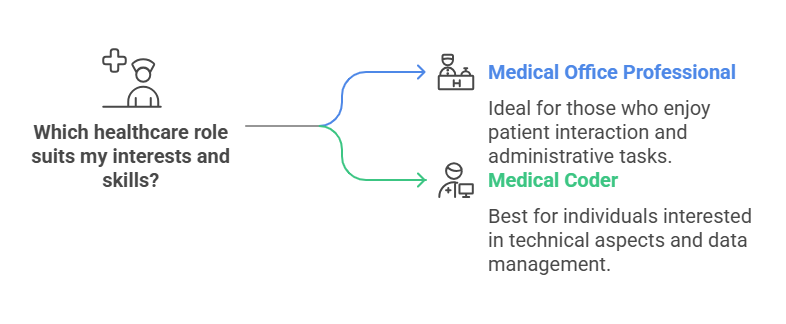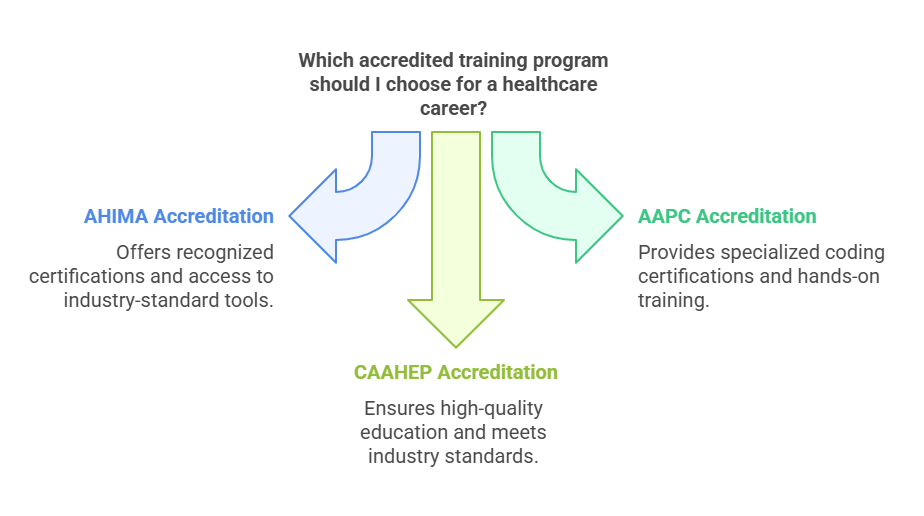How to Choose the Right Training for a Professional Medical Career
A career in the medical field is a noble and rewarding choice, offering stability, good pay, and the chance to make a difference in people's lives. However, with so many different roles in healthcare, choosing the right training program can be overwhelming. Whether you are considering a medical office role, a medical coding position, or a specialized path, the first step to success is choosing the right training. In this guide, we will cover key factors to consider when selecting training for a professional medical career.
Differences Between Medical Office and Coding Roles
Before diving into the specifics of medical training, it's important to understand the differences between various roles in the healthcare field. The primary distinction lies in job functions.
Medical Office Professionals typically handle administrative tasks such as patient scheduling, medical billing, and office management. They may also assist with insurance claims and patient communication.
Medical Coders, on the other hand, are responsible for translating medical diagnoses, procedures, and treatments into standardized codes used for billing and recordkeeping. Medical coders need in-depth knowledge of coding systems like ICD-10, CPT, and HCPCS.
Depending on your interests and skills, you may find one of these roles more suitable. If you enjoy working with patients and managing office tasks, a medical office professional role might be ideal. However, if you have an interest in the technical side of healthcare and working with data, a medical coding career might be the right fit.
Accredited Training Programs and Institutions
When choosing a training program, it is crucial to select accredited institutions that offer reputable certifications. Accreditation ensures that the program meets industry standards and provides high-quality education.
For those pursuing a career in medical office management or coding, look for programs accredited by organizations such as:
The American Health Information Management Association (AHIMA)
The American Academy of Professional Coders (AAPC)
The Commission on Accreditation of Allied Health Education Programs (CAAHEP)
These institutions offer specialized certifications that are recognized and respected within the healthcare industry. Accredited programs often include hands-on training and provide access to industry-standard software and tools that will be used in the workplace.
Financial Aid and Scholarships
The cost of medical training can vary widely, depending on the program and institution. Thankfully, Financial Aid is available through numerous options. Many accredited institutions offer scholarships, grants, and payment plans to help alleviate the cost burden..
Federal Financial Aid: Many students are eligible for federal student loans and grants. The Free Application for Federal Student Aid (FAFSA) is a great starting point for exploring available funding options.
Institutional Scholarships: Some schools offer merit-based scholarships or need-based aid. It’s important to research these opportunities and apply early to increase your chances of receiving funding.
Employer Assistance: Some employers offer tuition reimbursement or training grants, so if you’re already working in a medical facility, be sure to check with your employer.
Duration and Structure of Typical Courses
The duration of training programs can vary depending on the role and the type of certification. For example:
Medical Coding: Certification programs can range from a few months to a year, depending on the depth of the program. Some programs are designed to be completed part-time, allowing students to work while studying.
Medical Office Administration: These programs typically take one to two years to complete and may result in a diploma or associate degree. Some programs offer a more accelerated path, while others are more comprehensive.
Online Learning: Online courses are a flexible option for those who need to balance work, family, or other commitments. Many programs offer asynchronous classes, allowing you to complete assignments and lectures at your own pace. Make sure the online learning platform you choose is reputable and accredited.
Online Learning Platforms and Reviews
Online education has become increasingly popular, particularly in the healthcare field. When choosing an online program, consider the following factors:
Accreditation: Ensure that the platform is accredited by a recognized body, such as AHIMA or AAPC.
Curriculum: The course content should cover the essential skills and knowledge required for the role, including medical terminology, coding systems, and industry standards.
Student Reviews: Read reviews from former students to get a sense of the program’s effectiveness and quality. Websites like Trustpilot and Google Reviews often provide insights from actual participants.
Job Placement Support: Some programs offer job placement assistance or access to networking opportunities with healthcare employers. This can be a huge advantage when starting your career.
Conclusion
Choosing the right training for a professional medical career is a decision that can shape your future in the healthcare industry. Whether you’re interested in medical office management or coding, finding an accredited program that fits your schedule, budget, and career goals is essential. Take the time to research your options, consider financial aid, and select a program that offers comprehensive training with a strong reputation in the industry.
At ACMSO, we offer medical scribe certifications that help you get the skills you need for a rewarding career in the healthcare industry. Start your journey today!
Lesser-Known Facts
Medical coders often specialize in areas such as oncology or cardiology, which can lead to higher-paying opportunities. Learn more about medical coding specialties.
Coding systems are frequently updated, meaning coders need to complete continuing education to stay current. Check out the latest updates from AHIMA on coding systems.
The demand for medical coders is expected to grow by 8% from 2025 to 2035, according to the U.S. Bureau of Labor Statistics. Explore the BLS projection for medical coding jobs.
Some healthcare employers offer tuition reimbursement for medical coding certifications. Discover tuition assistance programs for healthcare workers.
Medical office professionals can work in various settings, including hospitals, private practices, and insurance companies. Read more about the medical office professional career options.
Online learning platforms often provide access to virtual labs for hands-on experience with coding software. Learn about virtual labs in medical coding education.
Certified coders may earn higher salaries than their non-certified peers due to the specialized skills they possess. Explore how certification impacts salaries in medical coding.
Medical coders can often choose to work in niche areas, such as radiology coding or mental health coding. Explore niche medical coding specialties.
Certification exams for medical coders typically require passing a comprehensive test that covers multiple coding systems. Get detailed information about certification exams for medical coders.
Continuing education is required to maintain certification in both medical office management and medical coding. Learn about continuing education requirements for medical coding.
FAQs
-
Medical office roles involve administrative tasks, while coding roles focus on translating medical procedures into standardized codes for billing and record-keeping.
-
Medical coding certification programs typically take 6 months to 1 year to complete, depending on the institution and whether you study full-time or part-time.
-
Yes, as long as the program is accredited by recognized institutions like AHIMA or AAPC, online programs can be a legitimate and flexible option.
-
Federal aid, scholarships, grants, and employer assistance are common financial aid options available for students pursuing medical training.
-
Yes, many medical coding roles offer remote work opportunities, allowing you to work from home, especially as you gain experience in the field.





